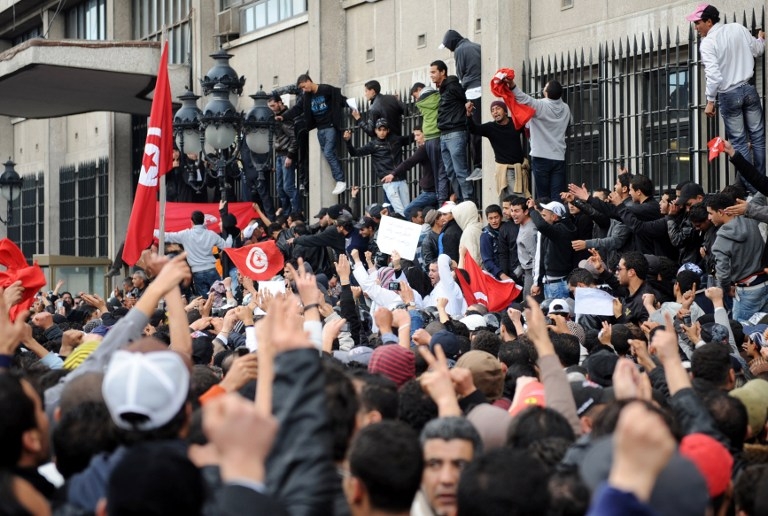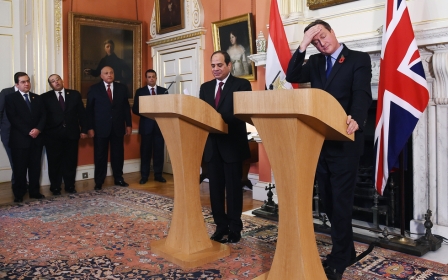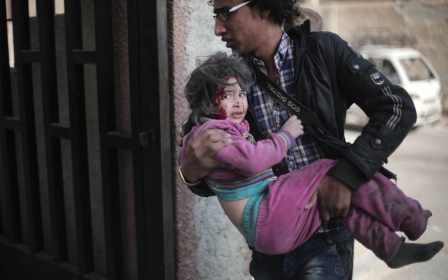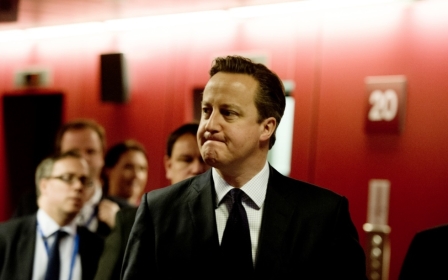Europe and the Arab Spring: Five years later

On 17 December 2010, a young street vendor set himself on fire after being humiliated by the police who had prohibited him from earning his meagre living. Mohamed Bouazizi passed away a few days later and didn’t know that he ignited the anger of his fellow Tunisians until they overthrew their tyrannical president, Zine El Abidine Ben Ali, in less than a month. Ben Ali fled out of fear while listening to his people chanting in French "Dègage!" (Leave).
Ben Ali remained president of Tunisia for 23 years with the help of an extremely brutal police force. However, throughout his presidency, he received political praise from Europe and had a good reputation in the media, as he engaged in public relations employing widespread deception, allowing Europe to believe he was a trusted partner, without giving any attention to the will of his people.
Despite the abundance of independent human rights reports regarding oppression, torture, and gagging of free speech during Ben Ali’s era, his image remained pristine to a large extent in the European media coverage and he continued to receive warm official welcomes in European capitals. The bold investigations published abroad during the final years of his rule failed to dispel the prevalent belief and image that he is the ideal president for the Arab world.
Even when the Tunisian people were revolting against his tyrannical regime for several weeks, politicians and journalists in Europe continued to find it hard to clearly criticise the ruling regime and the despotic president who received chronic praise. The headlines in European coverage and commentary did not label Ben Ali as a "dictator" until the final hours of his rule; that is when everyone was sure that his reign was over.
On 14 January 2011, the Tunisians celebrated their overwhelming success in overthrowing their tyrannical leader who had wished to remain in power with the help of a familial network which held on to the country’s economic arms in a mafia-like manner. The world suddenly applauded the Tunisians and photos of the Tunisian masses took over the European front pages for weeks. Politicians and commentators in Europe finally started to talk about the ugliness of the tyrant’s rule. It was only then that the European officials openly admitted that their foreign policies were wrong in favouring the regime in order to protect the Western interests in the Arab world over honouring their obligations to the standards of democracy, human rights, and the will of the people.
Egypt post-July 2013
But what happened after that? The European applause of the pro-democracy Arab Spring lasted for about two years, and then the language of colluding with the tyrants returned once again to the wider region – especially in Egypt. Today, it is clear that there is no practical value to the many human rights reports and the independent investigations regarding the heinous violations committed by the regimes attacking democracy. Despite the fact that Europe’s embassies witnessed the new atrocities up close and witnessed how the people were crushed and massacred in the squares, the hobby of welcoming tyrants by rolling out the red carpet resumed once again.
Today, everyone must forget all of the beautiful slogans, initiatives, and strategies proposed by European politicians during the Arab Spring. Who today remembers the "New European Neighbourhood Policy" announced by Catherine Ashton in May 2011, the Partnership for Democracy and Shared Prosperity with the Southern Mediterranean announced by the EU Commission in March 2011, the support for emerging democracies in the Arab world initiatives, or even the new version of the Euro-Mediterranean Partnership what was reproduced during the Arab Spring?
The truth is that democracy was trampled upon and crushed and a large number of excuses were made to carry out this brutal process that would not have happened if it wasn’t guaranteed European immunity from real criticism and punishment. There is no doubt that Europe’s politicians and most of its media coverage and commentaries avoided condemning what has happened, starting from July 2013, following the military coup in Egypt. Tyranny and oppression were reproduced in a brutal manner and the level of heinousness grew, reaching the extent of committing atrocious mass massacres in the squares against the peaceful protestors and those staging sit-ins. The new tyranny used public relations campaigns to mislead Europe and the world.
The powerful European states cannot avoid their responsibility in influencing some developments in their southern backyard. It has obligations and responsibilities and there is no room for confusion when it comes to choosing between democracy and military tyranny, freedom and oppression, human dignity and torture.
Some have said that the European foreign policies do aim to spread democracy but rather work by the logic of interests and national security - as if the European commitment to support democracy, freedom, and human rights has no value in times of hardship. Well, I must remind everyone that the tyrannical and corrupt regimes are the ones that produced the social and economic time bombs, as they failed to provide work opportunities for millions of its youth every year. These regimes crushed their people's hopes and created the atmosphere incubating and producing the culture of violence and extremism, pushing Arab generations to make blind decisions, such as risk drowning in the Mediterranean Sea or falling prey to Daesh’s propaganda.
-Hossam Shaker researcher and author, consultant in media, public relations, and mass communication for a number of organisations in Europe, resides in Vienna: He has an interest in analysis of European and international affairs, as well as social and media issues.
The views expressed in this article belong to the author and do not necessarily reflect the editorial policy of Middle East Eye.
Photo: Tunisian demonstrators, some standing on the windowsills and main door of the Interior ministry in Tunis, on 14 January, 2011, rally demanding President Zine El Abidine Ben Ali's resignation (AFP).
Middle East Eye propose une couverture et une analyse indépendantes et incomparables du Moyen-Orient, de l’Afrique du Nord et d’autres régions du monde. Pour en savoir plus sur la reprise de ce contenu et les frais qui s’appliquent, veuillez remplir ce formulaire [en anglais]. Pour en savoir plus sur MEE, cliquez ici [en anglais].





